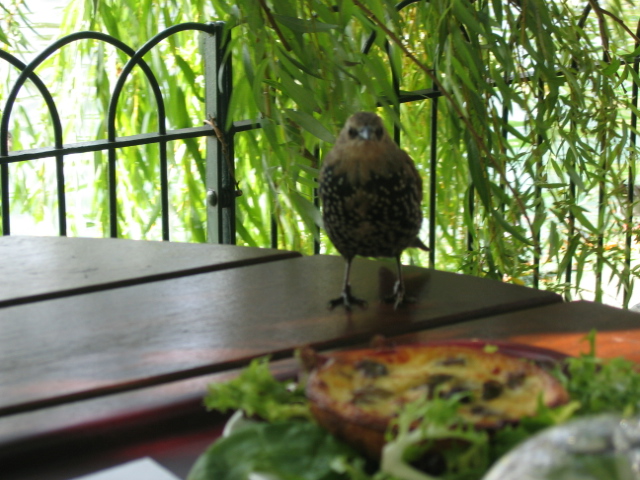Birds
I've only got one photograph to share at the moment:
 |
The starling
At the north east end of the Serpentine in Hyde Park is a café called The Dell, with
tables outside in the shade of the trees. My wife was
going to enjoy a quiche and salad there, but forgot to get cutlery to eat it with. She
went back inside to find some, and while she was away this starling flew to the edge of the
table and began to walk determinedly towards the quiche. My brandishing the camera didn't
halt its advance, and only a hand placed firmly in front of its face finally got it to fly
reluctantly away.
No doubt the starlings and other birds in the vicinity are never mistreated by humans,
so have lost any fears of more than a mild reprimand!
|
The crow
Some years ago we lived in an apartment with a tiny north facing balcony, which made a very
convenient larder. The crows which might have been expected to raid it were clearly afraid of
being trapped in the narrow space. Except for one. There was a very old crow about, a bit
sluggish in flight and walking, and with far more grey feathers than black. I'm not completely
certain, but I believe that was the one which gobbled up the best part of an apple. It was
undoubtedly a crow - the beak marks were unmistakable.
So why was the old bird so much braver than the young ones? Two explanations come to mind, one
romantic, and the other more "scientific" and likely. The romantic one is that the bird was
too old to care, and thought that dying in the middle of a delicious snack would not be a bad
way to go. But of course only humans have the concept of death. The likely explanation is that
the old crow was losing out to all the younger ones in any competition over scraps of food.
Going for the stuff on the perilous balcony was the only way of assuaging its hunger!
Rose-ringed parakeets
Thinking of Hyde Park once more, my favourite spot in central London, I was startled there
last summer by a shrieking in the trees more reminiscent of a tropical rainforest documentary
than a UK park. I was able to spot a number of medium sized green birds with parrot like
heads. A quick check in an internet café later in the day revealed that they were
rose-ringed parakeets,
birds native to
Africa and India. It seems there are thousands living wild in southern England by now,
most probably descendants of escaped pets. They do make an interesting addition to British
wildlife, but I hope they do not turn out to be in competition with any native species.
There is an urban legend in London that these parakeets descend from some that were used in
the filming of jungle scenes at nearby Shepperton studios for the 1951 classic "The African
Queen", with Katharine Hepburn and Humphrey Bogart. It probably is just a legend, though.
The budgerigar
Parakeets make me think of
budgerigars, and one in particular, the pet of a primary school friend of mine many years
ago. From time to time that budgie was allowed out of his cage to fly round the living room,
after a careful check had been made of all the doors and windows. The bird was really
friendly, and I always remember how he stood on my shoulder and tugged tufts of my hair
through his beak. Budgies regularly groom each other's feathers to show affection, and I
suppose hair is more similar to feathers than anything else on a human. The little bird also
demanded some fuss in return, and if you deliberately ignored him, he would tug at your ear,
or tear bits of paper from any book or newspaper you happened to be reading. I don't remember
there was much trouble about coaxing him back into the cage after one of these sessions.
Birds and cats
That behaviour of showing affection and demanding some in return reminds me of our cats. I
have never had much experience of the larger, more intelligent birds like parrots, apart from
saying hello to them in pet shops, but I would imagine they have a lot in common with
domestic cats, as far as brain power and interaction with humans is concerned. People often
speculate about whether other intelligent life forms in the universe are similar to us or
quite dissimilar. Perhaps here we have the nearest thing to an answer at the moment. The
ancestors of birds and the ancestors of mammals must have diverged many millions of years ago,
but they still have similar intelligent behaviour. Would aliens turn out to be intelligible to
us? I rather suspect the answer is yes!
